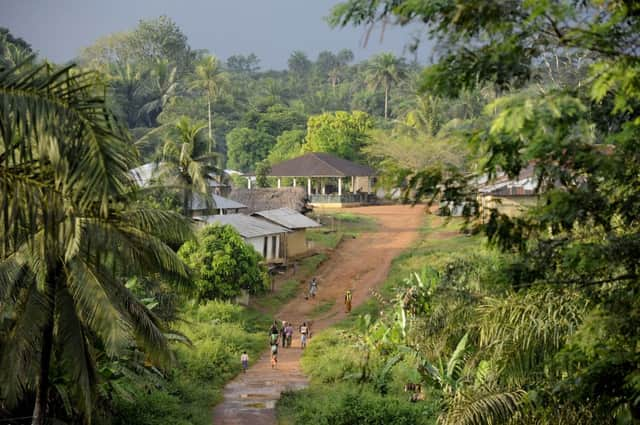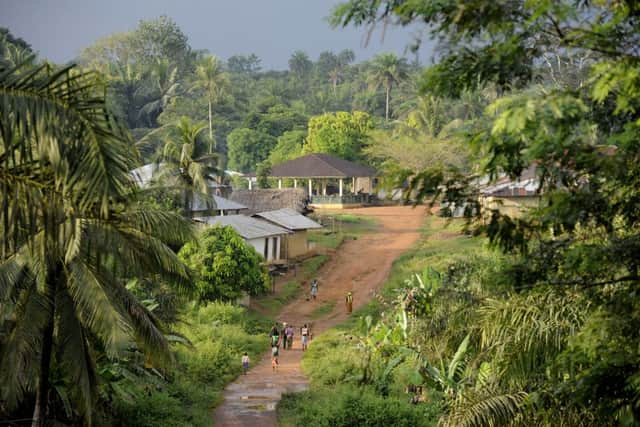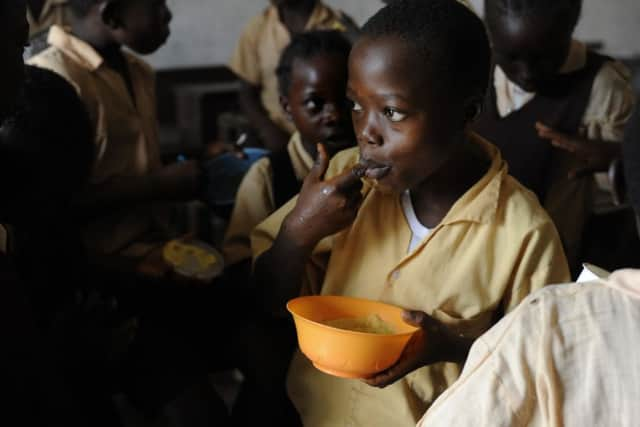The work of Scottish charity Mary’s Meals


Then there are the practical problems of delivering 50kg sacks of rice or soya mix in lorries on dirt roads that turn to mud at the first downpour, and in some cases have to be delivered by canoe, as well as building kitchens and latrines to make feeding possible in the first place.
Yet the initial vision of founder Magnus MacFarlane-Barrow of providing a solution to hunger by giving children one daily meal in their place of education hasn’t changed since they started feeding children in Malawi in 2002 as a one-off school feeding programme. The idea grew and feeding programmes sprang up where Mary’s Meals identified need, which in a world where 300 million children are chronically hungry, is widespread. In Liberia alone, the feeding programme has trebled in size in the last 18 months.
Advertisement
Hide AdAdvertisement
Hide AdMary’s Meals currently feeds children in 16 countries, with most of the big projects being in Africa. Malawi is the biggest, with 600,000 students, then Liberia, Kenya, Uganda, South Sudan, Haiti, then India. They also feed in Ecuador, Burma, Thailand, Albania and Ukraine. As well as its base in Scotland, there are offices in the US, Germany, Austria and Croatia.


“Next year Mary’s Meals aims to reach even more children with a large-scale project in Zambia and we have agreed some expansion with partner groups, the most significant of which will be in Haiti and India,” says Oscar Mendoza, Director of Overseas Programmes at Mary’s Meals. “Our strength is having local people on the ground who are very committed and have great understanding of the culture and ways of working, as well as being highly skilled. That’s what makes the difference.”
While Mary’s Meals is keen to expand, especially in Liberia where new staff are being employed and the government is keen to copy the charity’s efficient model, they are wary of not exceeding the capabilities of the organization.
“We are growing, but are still a relatively small organization and don’t want to become too thinly spread. We want to keep it very simple and resist the temptation to start doing all sorts of things. Every village you see needs agricultural development or water and there are other issues in the countries we feed in, but our mission is one thing, and that’s delivering meals in schools,” he says.


“We want to collaborate with other organizations doing other things, but the other things won’t work without what we do, so we have to keep delivering that. There’s always that temptation to start kidding yourselves that you can do it all, but you can’t, so we stick to delivering meals in schools.”
Mary’s Meals raised £10 million last year, a growth of 25 per cent and is proud that 93p of every £1 is spent directly on charitable activities. This year The Scotsman and Scotland on Sunday have teamed up with the charity for our Christmas appeal.
“The Scottish people seem to have taken us into their hearts. Of our donations, 70 per cent come from Scotland and much of it from small individual donations,” says MacFarlane-Barrow.
Typical of the children who benefit, are 11-year-old Nadma, who feeds at the Uttar Pradesh centre in Masuri, India. Put to work as a seamstress when she was six, she worked full-time before being given the chance to attend a Mary’s Meals centre. Nadma still works part-time to survive, but knows the centre is opening up more hope for her future.
Advertisement
Hide AdAdvertisement
Hide Ad“I still have to work in the afternoons, but I can come here every morning to learn and to eat because it does not cost my family anything. I have learned how to read and write in my own language and now I have started learning English. Things are not always easy. My father is not well and we are very poor. But we believe my studies will make our lives better and the daily meal is an assurance to my family that I will not go hungry. I will study for as long as I can and my dream is to one day become a doctor.”
Nadma’s story is repeated again and again in classrooms where Mary’s Meals are served every day. For many that will be the only meal of the day. Just £10.70 is the average global cost of a whole year of those meals.
“It’s about lots of us doing small things and they become very big when you put them all together, by sticking to the simple things and focusing on what we do best. One meal, one child, and keep doing that,” says MacFarlane-Barrow.
SEE ALSO: